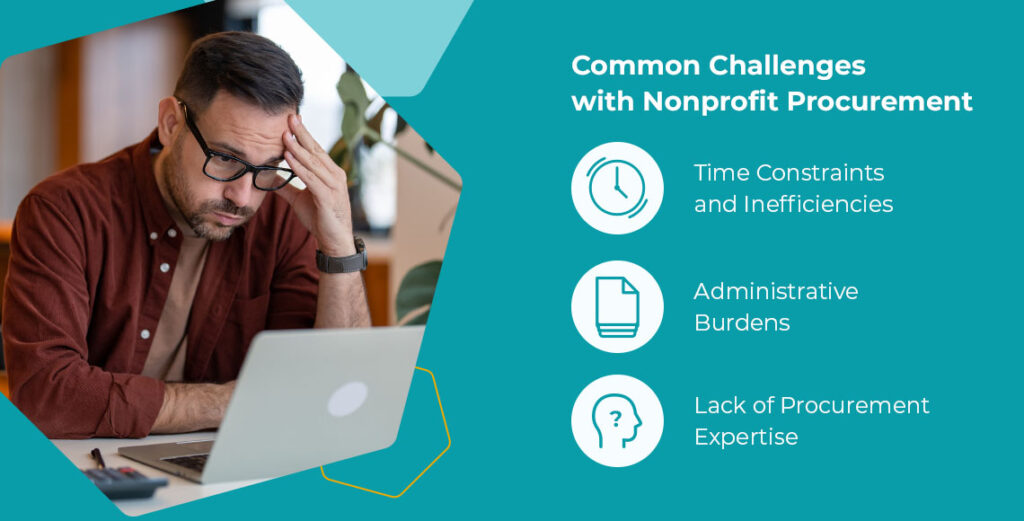Reading Time: 4 minutes
Procurement is always top of mind for nonprofit organizations, and finding ways to streamline and improve these policies can help yours thrive.
We are breaking down the key considerations for creating a procurement policy for nonprofits that benefits and enhances your overall mission.
Importance of Effective Procurement Practices
Nonprofit organizations rely on strategic and effective procurement practices to:
- Reduce costs: Efficient procurement strategies that support competitive negotiation and take less time can help your organization save operational costs that can go toward your mission.
- Optimize resources: Getting the most out of every dollar spent is a priority for nonprofits. The right procurement practices help your organization secure goods, services, and resources at the best value.
- Manage risks: Great procurement practices include rigorous documentation and record management, helping your nonprofit prove compliance and manage financial risks.
The nonprofit procurement policy you create will determine your organization’s success, and finding ways to continuously improve these processes will inspire long-term growth.
Checklist for Creating a Procurement Policy for Nonprofits
The following is a useful checklist to reference when crafting your nonprofit’s procurement policy:
1. Roles and Responsibilities
Delegating spending management and procurement responsibilities and duties to designated members or departments of your organization helps your nonprofit harness greater control over these processes.
Giving your leaders specific roles or titles, such as procurement officer or contract manager, can help your organization foster greater accountability.
2. Spending Approval
Another important part of an effective procurement policy is defining how your organization will approve spending, especially when making purchases over a certain monetary threshold.
It can be helpful to establish a hierarchy for getting spending approval. For example, purchases that meet certain spending limits will require approval from predetermined individuals — the more you spend, the more people you’ll typically need approval from.
3. Ethical and Compliance Standards
Nonprofits must meet strict compliance and ethical standards, and the same is true for the suppliers and vendors they choose to work with.
Including compliance expectations in your procurement policy will help your organization manage socially responsible sourcing that aligns with your mission.
You’ll also need to include guidelines for abiding by the laws, regulations, and reporting requirements that apply to nonprofits.
4. Vendor Criteria
Your nonprofit should establish guidelines and criteria for assessing vendors. Before making a purchase, your organization needs to explore factors such as:
- Price
- Quality
- Sustainability
- Social responsibility
Nonprofits should prioritize selecting vendors and suppliers who demonstrate ethical and inclusive values.
5. Documentation and Record-Keeping
Include requirements for maintaining comprehensive procurement documentation. Your record-keeping of procurement-related activities will help your organization harness greater financial transparency and streamline compliance efforts.
Your documentation policies should help your organization reduce administrative burdens, especially for smaller nonprofits that do not have the personnel to efficiently tackle these responsibilities.
6. Purchase Order Review Protocols
Evaluating your nonprofit’s purchase orders is an integral part of ensuring you get the most out of every dollar spent. Outline your organization’s protocols for this process to determine whether or not you are realizing a maximum return on investment.
7. Contract Negotiation and Management
Your nonprofit has to negotiate the terms and conditions of each procurement contract, which takes valuable time away from your cause.
Establish policies for managing negotiations, keeping records, and evaluating the performance of your contracts.
Common Challenges with Nonprofit Procurement

In trying to establish effective procurement processes, your organization might encounter a few roadblocks along the way. Explore some common challenges below:
Time Constraints and Inefficiencies
Procurement processes, including soliciting bids and negotiating contracts, can be very time-consuming for nonprofit organizations. Many of these tasks are complex and involve multiple individuals.
If your organization does not have the time or resources available to give each spending decision the attention and thought required, you could end up making rushed decisions, resulting in:
- Errors
- Inefficiencies
- Overspending
Administrative Burdens
It is not uncommon for nonprofits to have limited resources and personnel, which means a few people are usually responsible for a large number of administrative tasks, such as:
- Record-keeping
- Documentation
- Reporting compliance
Balancing procurement efforts with other administrative duties can be overwhelming and ineffective for some teams.
Lack of Procurement Expertise
Procurement can become very complex for some nonprofits. It can quickly become inefficient, tedious and error-prone as you introduce more stakeholders and systems to your process. Organizations without a dedicated procurement staff or a few individuals with expertise on their team will likely struggle to make the best and most financially sound decisions.
How to Improve Your Procurement Process
By taking steps to boost your procurement efforts, you can set your organization up for greater success. Explore the following tips and suggestions for enhancing this process:
Monitor and Evaluate Your Existing Procurement Process
Begin by taking a moment to assess your current operations. Is your procurement process efficient? Are there dedicated team members taking care of these responsibilities? Are there areas where your efforts are falling flat? How is your current process thriving?
Taking inventory of your existing procurement process will help you determine what changes to implement first.
Foster Vendor Relationships
Building strong, lasting relationships with your vendors and suppliers can help your nonprofit get better pricing, service and responsiveness. Remember to work with businesses and organizations that align with your values and mission, especially if seeking long-term partnerships.
Cultivate a Culture of Continuous Improvement
Your organization can benefit from applying the principles of continuous improvement to its procurement process. Regularly reviewing your efforts, collecting feedback from your staff and stakeholders, and consistently seeking out opportunities for growth will help your nonprofit establish the best procurement practices possible.
Embrace Technology
The most effective way to supercharge your procurement process is by utilizing software solutions that help to streamline and automate many of these tasks, including:
- Overseeing contracts
- Vendor coordination
- Bid solicitation
- Data management
The right procurement software will help your nonprofit increase efficiency and reduce administrative burdens, so your team can focus on its mission.
Request a Demo of the Procurement Solutions from MIP Fund Accounting®
Are you looking to take charge of your nonprofit’s procurement strategy? Turn to the procurement software from MIP Fund Accounting®.
Our solutions will help your organization streamline procurement with customer-developed modules. We’ll help you save time and energy on common purchasing tasks like issuing purchase orders and encumbrances. With our platform, you can take greater control over your organization’s procurement process. Plus, you can enjoy enhanced asset tracking that enables better monitoring, reviewing, and auditing.
Are you interested in learning more? Request a demo of the nonprofit procurement module from MIP Fund Accounting® today!





